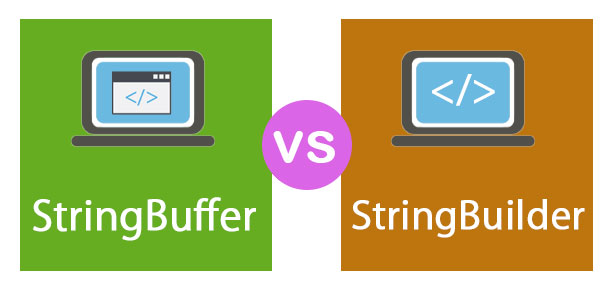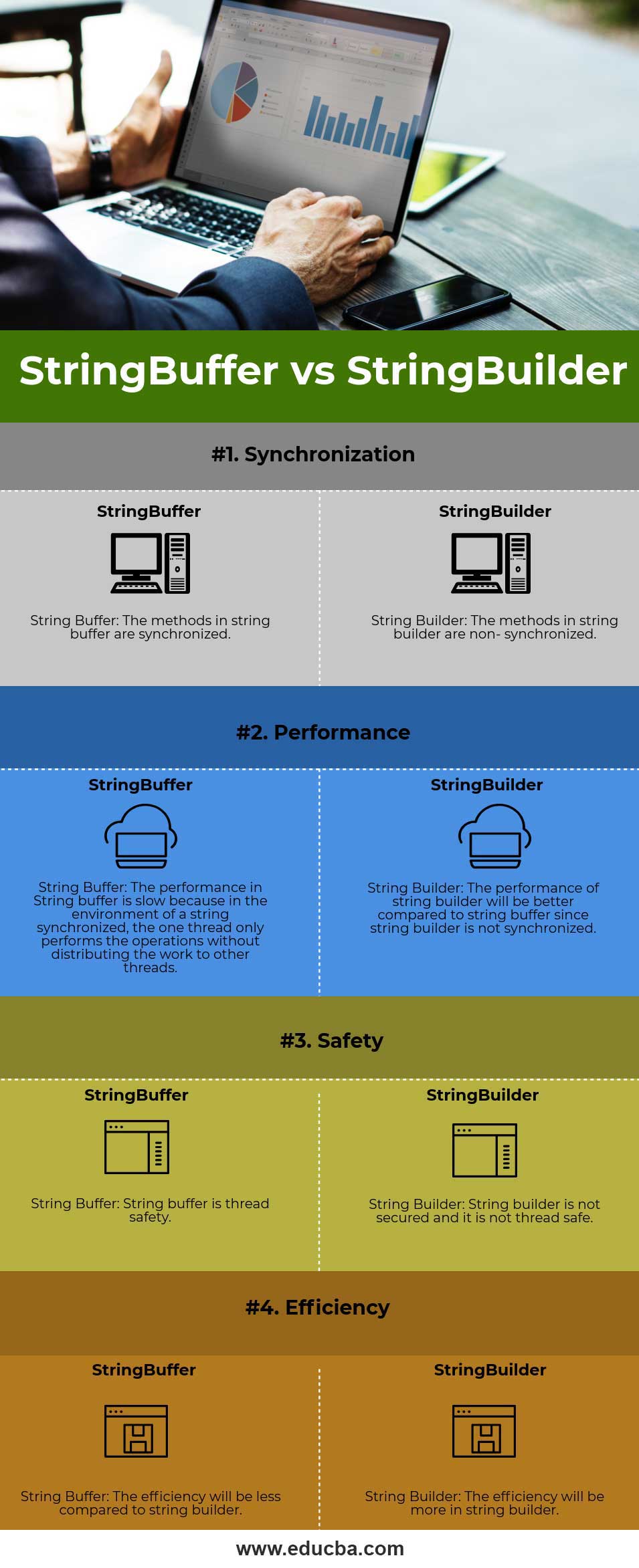Updated March 14, 2023

Difference Between StringBuffer and StringBuilder
The string peer class is a string buffer. String buffer consists of a string’s functionalities; it occupies more functionality and features than a string. We all know that string possesses immutable and fixed-length character, whereas string buffer possesses the characters, such as increasable and the writable series. The advantage of string buffer is that it automatically grows when there is a need to add characters and substrings in between or at the bottom. String builder is one of java’s mutable string objects. String builders can be modified at any point through method invocations.
There won’t be any synchronization in a string builder that resembles to be a .not safe thread.
String buffers vs String builders are almost the same, but the String builder is not that safe and not synchronized; if the synchronization is required, then java uses the string buffer. Due to the additional features that are permittable for a programmer advantage, a new edition in Java 1.5, a string builder, is added. And along with this, there are some variations that can be discussed in this article.
Head to Head Comparison between StringBuffer and StringBuilder (Infographics)
Below are the top 4 differences between StringBuffer vs StringBuilder

Key Differences between StringBuffer and StringBuilder
Let us discuss some of the major differences between StringBuffer vs StringBuilder:
- String Buffer is introduced in Java 1.4 versions. But String builder is the latest, which is introduced in 1.5 versions of java.
- String buffer can be synchronized, but the String builder is non-synchronized.
Thread safety is there in String buffer, but there is no thread-safety in String Builder. - A string buffer is slower when compared with the String Builder.
- For String concatenation, String builder has to be used, and it also helps in dynamic string creation, but if you are more in need, only String buffer has to be used.
- Depending on the version of java we are using, Plus (+) operator implicitly uses string buffer or string builder during the string concatenation. Suppose if the version of java we are using is 5 or higher than 5, then string builder has to be used, and if the version is lower than 5, then string buffer has to be used.
Example for String Buffer
Java Program to demonstrate the use of StringBuffer class.
public class BufferTest{
public static void main(String[] args){
StringBuffer buffer=new StringBuffer("hello");
buffer.append("java");
System.out.println(buffer);
}
}
Example for String Builder
Java Program to demonstrate the use of StringBuilder class.
public class BuilderTest{
public static void main(String[] args){
StringBuilder builder=new StringBuilder("hello");
builder.append("java");
System.out.println(builder);
}
}
The extra methods such as substring, capacity, trim to size, length, etc. can be visible only in the string buffer, but these methods are not implemented in string builder since it has by default.
StringBuffer vs StringBuilder Comparison Table
below is the top most comparison between StringBuffer vs StringBuilder
|
Synchronization |
|
| String Buffer: The methods in string buffer are synchronized. | String Builder: The methods in string builder are non-synchronized. |
|
Performance |
|
| String Buffer: The performance in String buffer is slow because, in the environment of a string synchronized, the one thread only performs the operations without distributing the work to other threads. | String Builder: The performance of the string builder will be better compared to string buffer since a string builder is not synchronized. |
|
Safety |
|
| String Buffer: String buffer is thread-safety. | String Builder: String builder is not secured, and it is not threaded safe. |
|
Efficiency |
|
| String Buffer: The efficiency will be less compared to a string builder. | String Builder: The efficiency will be more in string builder. |
Conclusion
Due to the drawbacks in String buffer, a new string class called String builder has created in java 1.5 versions. Due to the strong implementations of methods, for certain cases, the String builder can be used instead of String buffer since the string builder’s performance is very high and fast compared to a string buffer. It’s a known fact; String builder is almost similar to the string buffer, where certain factors differentiate StringBuffer vs StringBuilder. We should be aware of where to use a string buffer and where string builder has to be used.
For instance, in a non-synchronized process, a string builder has to be used for better results along with the high speed of execution, whereas if we need the result in the synchronization environment, we should seamlessly make use of string buffer. Consider the factor that we have seen above about thread safety. If you are not much worried about thread safety, it’s a better choice to go ahead with the string builder; else, string buffer is the best choice for thread safety in the existing scenario.
But unlike the differences, they both come up with mutable characters. And if you have a close look at the syntax or code of class StringBuilder. java, you would be having a clarification that it’s a non-synchronized string buffer only. By this, you might have better clarity on the usage of both classes, i.e. string buffer and string builder.
Recommended Articles
This has been a guide to the top difference between StringBuffer vs StringBuilder. Here we also discussed the key differences with infographics and comparison table. You may also have a look at the following articles to learn more.

